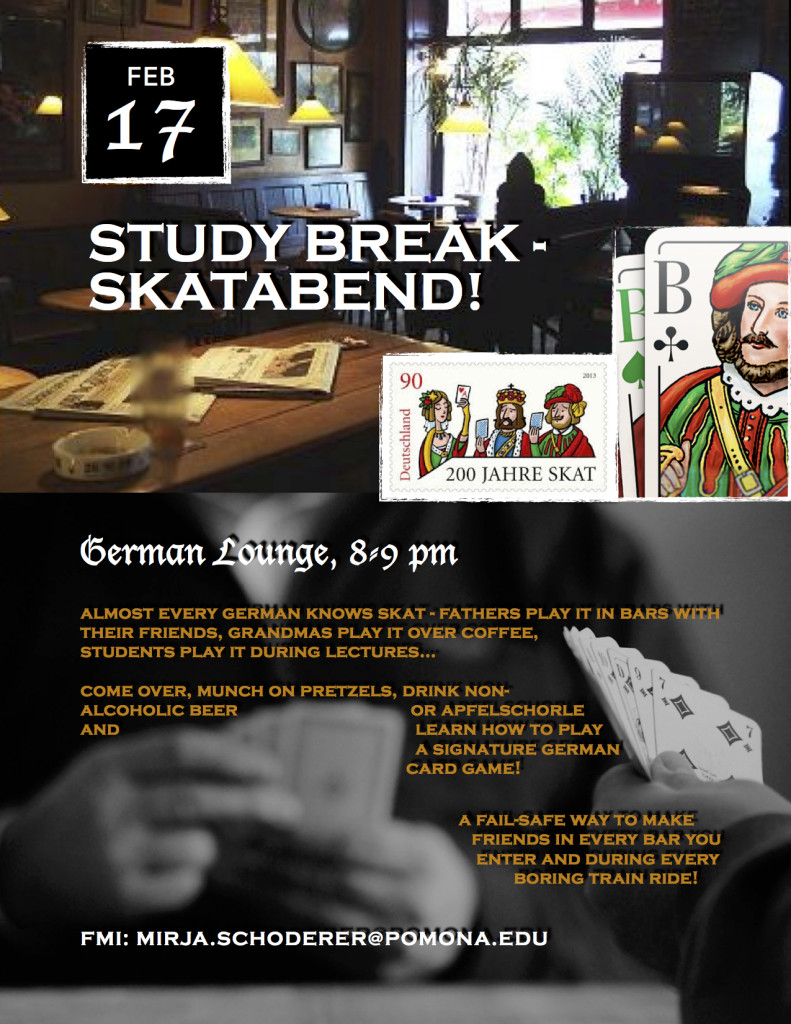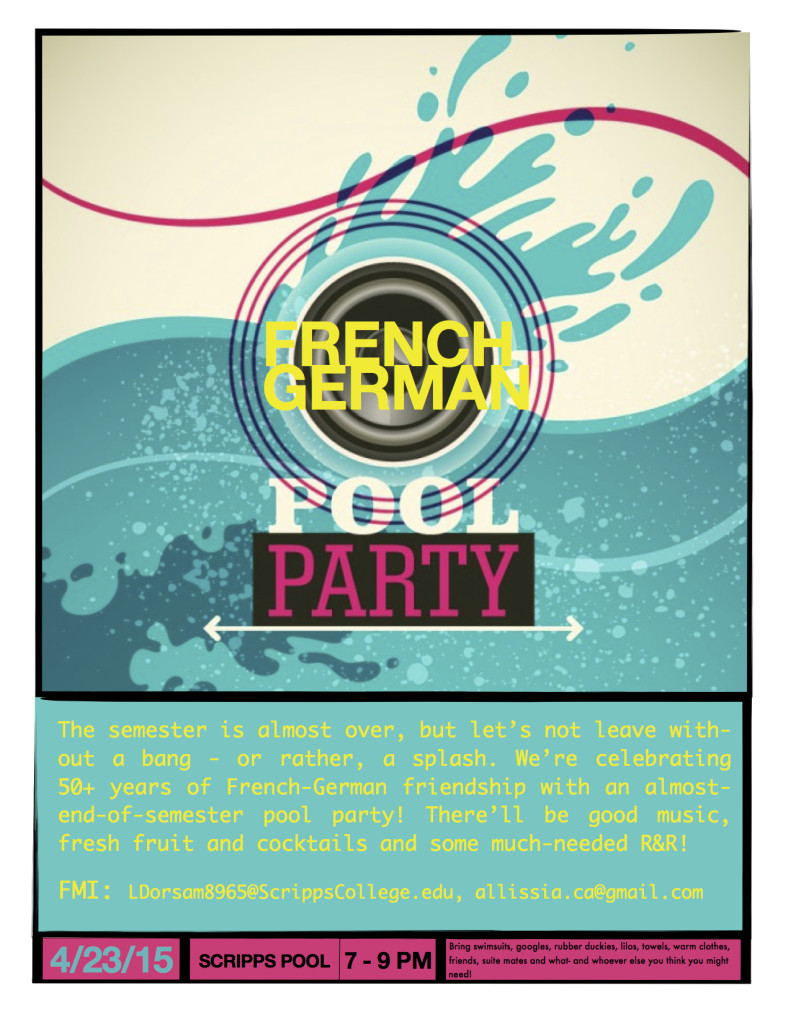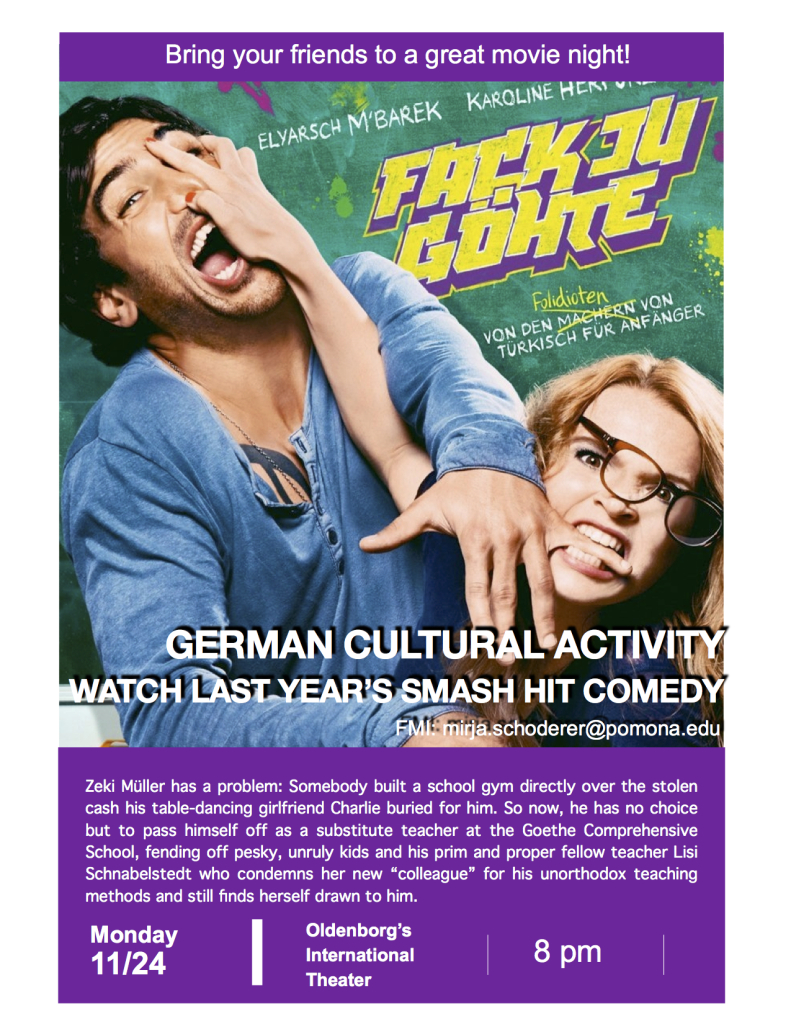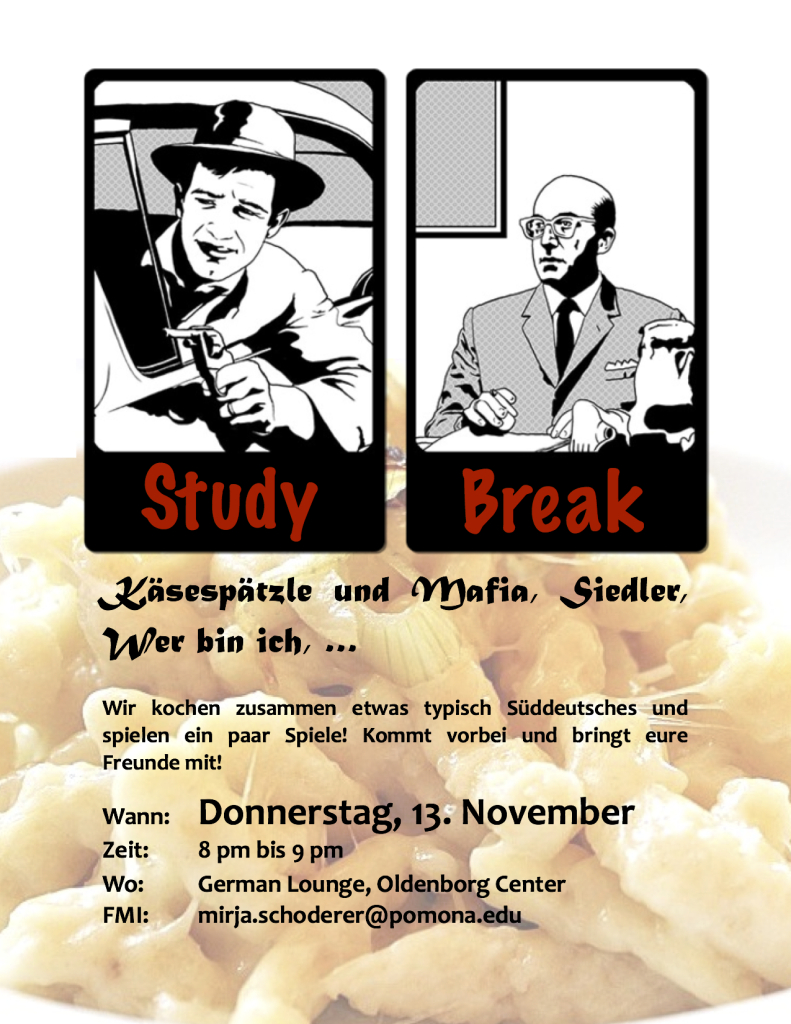Author: Mirja Schoderer
Conversation Class Lesson Summary
Language Resident Name: Mirja Schoderer
Day and Date: Wednesday , 4/15/15
Language and Level (intermediate or advanced class): German intermediate
Class theme/topics discussed: Sentence structure
Goal of the class: repeat sentence structure
How did you structure the class?
Ice Breaker: talk about the rest of the week and their plans for the weekend
Activity One: review sentence structure with an example sentence
Activity Two: I had prepared cards with different words and sentence parts on them and they had put them in as many different combinations as possible
Activity Three: I gave them postcards, some of them my own from around the US, some of them leftover from the Open House with German cities and asked them to write a fake postcard, starting every sentence with a different part of a sentence
What technology, media or props did you use? (internet resources, playmobiles, handouts, etc.)
Printed cards, postcards, whiteboard
What worked well in this class? What did not work?
It was a great class! They really enjoyed the game and the postcards and I feel that after the rather dry grammar part of our last class, this was the perfect end to this grammar unit
How could this class be improved/ modified?
If you have a more detailed lesson plan, please attach it below (OK to use target language for that). Please attach any handouts as well.
Conversation Class Lesson Summary
Language Resident Name: Mirja Schoderer
Day and Date: Monday, 1/21/2015
Language and Level (intermediate or advanced class): German intermediate
Class theme/topics discussed: Feelings
Goal of the class: Familiarize the students with the vocabulary for describing people and feelings
How did you structure the class?
Ice Breaker: Talk about the weekend – who saw the Pomona – CMS basketball game? Talk about the swim meet (one of my students swims for the team), have everyone present themselves again because we had a new student
Activity One: Watch a short comedy clip that introduces the topic and vocabulary (https://www.youtube.com/watch?v=W9rIhhxfWTs)
Activity Two: Which adjectives were in the video? Which other ones do you know to describe people/feelings
Activity Three: I prepared a handout with emoticons and another one with adjectives describing feelings. The students had to match the feelings to the emoticons
Activity Four: Guess a feeling. I prepared cards with an adjective on them that describes a feeling. The students each drew a card and then we all said the same simple sentence (“I’m meeting Sven tomorrow”) but with an inflection and gestures appropriate to whatever feeling each student had on their card. The rest of the group had to guess which feeling the student was trying to portray.
What technology, media or props did you use? (internet resources, playmobiles, handouts, etc.)
Video, whiteboard, handout
What worked well in this class? What did not work?
The students loved the video (I already used it in my intermediate class last semester and they really liked it too) and impressed me with how many adjectives they already knew. They liked the exercise with the emoticons and trying out the new vocabulary in the last activity drew a lot of laughs
How could this class be improved/ modified?
At first I thought the exercise with the emoticons took a bit too long and should maybe be done with less vocabulary. But then the students started bringing the handout to the next class to look up words which means they actually value it as a resource, so maybe it was a good idea to make it comprehensive
If you have a more detailed lesson plan, please attach it below (OK to use target language for that). Please attach any handouts as well.
Conversation Class Lesson Summary
Language Resident Name: Mirja Schoderer
Day and Date: Thursday, 4/30
Language and Level (intermediate or advanced class): German advanced
Class theme/topics discussed: Fairytales, scavenger hunt, evaluations
Goal of the class: review the vocabulary we learned this year
How did you structure the class?
Ice Breaker: We talked a little about what’s going on on the weekend
Activity One: I had prepared scavenger hunt that started in the German Lounge and led the students through and around Oldenborg while reviewing some of the vocabulary we learned throughout the semester
Activity Two: I gave them the evaluations to complete
What technology, media or props did you use? (internet resources, playmobiles, handouts, etc.)
« Handout »
What worked well in this class? What did not work?
They absolutely loved it and even thanked me explicitly for preparing this
How could this class be improved/ modified?
If you have a more detailed lesson plan, please attach it below (OK to use target language for that). Please attach any handouts as well.
Conversation Class Lesson Summary
Language Resident Name: Mirja Schoderer
Day and Date: Thursday, 4/10/15
Language and Level (intermediate or advanced class): German advanced
Class theme/topics discussed: Crime
Goal of the class: introduce vocabulary around crime, familiarize the students with one of the most popular German TV series right now
How did you structure the class?
Ice Breaker: how did you like working on the project? What was new, also in terms of language?
Activity One: Which words do you know that are related to crime? How could someone die? I checked the words off of a list I prepared and handed it around in the end so they could see which vocabulary was still new
Activity Two: Work in pairs: One of you describes a crime scene, the other one has to draw it
Activity Three: “Black Story”. A black story is a very short account of a crime/ crime scene, the audience then has to guess what happened, using only yes or no questions
Activity Four: We watched the first episode of the German TV show “Tatortreiniger” which is about someone who comes to clean up crime scenes. An episode is only 25 minutes, so there was enough time to stop every now and then and make sure they understood the main points (there are no subtitles for the show)
What technology, media or props did you use? (internet resources, playmobiles, handouts, etc.)
Youtube, whiteboard, handout
What worked well in this class? What did not work?
They loved the class and kept using the words even in later classes, so for some reason it must’ve been memorable
How could this class be improved/ modified?
If you have a more detailed lesson plan, please attach it below (OK to use target language for that). Please attach any handouts as well.
Das Verbrechen
| Der Mord, der Mörder, jemanden ermorden, der Selbstmord |
| Die Tat, der Täter, der Tatort |
| Der Beweis, etwas beweisen, das Beweismittel |
| Die Spur, Spuren suchen, die Spurensicherung, der Fingerabdruck |
| Der Tod, töten, tot |
| Die Leiche, der Leichnam |
| Das Blut, bluten, die Blutflecken |
| Die Polizei à die KriPo, der Kommissar, der Detektiv |
| Das Gericht, der Richter, der Anwalt, das Urteil, jemanden verurteilen |
| Das Verbrechen, der Verbrecher, ein Verbrechen begehen |
| Das Gefängnis / der Knast (colloq.), im Gefängnis sitzen
|
Conversation Class Lesson Summary
Language Resident Name: Mirja Schoderer
Day and Date: Thursday, 1/29/2015
Language and Level (intermediate or advanced class): German advanced
Class theme/topics discussed: Gestures review and slang
Goal of the class: consolidate the vocabulary from Tuesday and introduce them to the most important slang words in German as well as one of the best and most famous German singers right now
How did you structure the class?
Ice Breaker: We talked about our plans for the weekend (one of my students is turning 21 and everyone spontaneously came up with ideas for how he could spend his birthday) and about Halona
Activity One: The students asked for a review of Tuesday’s topic right in the beginning, so I got out the same cards and had them act out the gestures and guess the names for them again.
Activity Two: We listened to the song “Oh Jonny” by Jan Delay twice and I gave the students the lyrics where they had to fill in the blanks. We then discussed the cultural references the song makes both in the video and the text
Activity Three: We discussed the slang words in the text and what other slang words the students know
Activity Four: There is this thing in Germany called “Your mom” jokes, which basically are mean one liners about people’s mothers. At this point, everyone back home is so familiar with those that just the words “your mother” are enough to start or finish a whole conversation. We look at a couple of the jokes
Activity Four: I prepared a slang puzzle and the students have to match the slang expressions with their standard German equivalents
Activity Five: Work in groups of three and write a short dialogue using as many slang words as you ca
What technology, media or props did you use? (internet resources, playmobiles, handouts, etc.)
Video, whiteboard, handout
What worked well in this class? What did not work?
Everything worked great! The students enjoyed the game, loved the song and were interested about its cultural implications. And they got the chance to shine with knowledge you can’t usually shine in a classroom with. They knew the most obscure expressions and the class was a lot of fun for all of us.
We didn’t get further than activity three, though. I’ll do the rest of the lesson on Tuesday next week
How could this class be improved/ modified?
More time!
If you have a more detailed lesson plan, please attach it below (OK to use target language for that). Please attach any handouts as well.
Language Resident Name: Mirja Schoderer
Day and Date: Tuesday, 09/30/2014
Language and Level (intermediate or advanced class): German advanced
Class theme/topics discussed: Movies
Goal of the class: Analyze short scenes of a movie, develop ideas about the content of the movie, come up with a voice over to one scene
How did you structure the class?
Announcements, talk about Midterms
Activity One: Watch a short scene of a movie without the sound. One of the students had his back to the screen, the other had to describe what was happening. Every 30 seconds, they switched
Activity Two: We watched the whole sequence together, still without sound. What do you think is happening? What could the movie be about? What sort of movie is it (judging by the colours, gestures, …)
Activity Three: Based on the hypotheses you just formed, what could the characters be saying? Do a voice over of one of the short scenes we just saw
Activity Four: Watch the scenes with sound. What’s really happening? What could have happened before? What after?
Activity Five: Watch the trailer to the movie to see how close we came to its actual content
What technology, media or props did you use? (internet resources, playmobiles, handouts, etc.)
Video, whiteboard
What worked well in this class? What did not work?
Doing the voice over was a lot of fun, even though one of my students had already seen the film. Unfortunately, the class was not all that creative and needed a lot of guidance to come up with different scenarios of what could have happened or was going to happen
How could this class be improved/ modified?
I feel like the activities would have worked a lot better in a bigger group (I only had two people)
If you have a more detailed lesson plan, please attach it below (OK to use target language for that). Please attach any handouts as well.
Language Resident Name: Mirja Schoderer
Day and Date: Wednesday, 12/03/2014
Language and Level (intermediate or advanced class): German intermediate
Class theme/topics discussed: Christmas, comparative and superlative
Goal of the class: revision of Christmas vocabulary and grammar discussed on Monday, expand on the grammar, short wrap up
How did you structure the class?
Ice Breaker: Christmas cartoon,announcements. How was the week so far, how crazy will next week be (finals)?
Intro: What did we do last time (one of my two students wasn’t there, so the other one gets to broadly summarize)
Activity One: Write all the words you associate with Christmas and winter on the board. Read them out loud and explain the ones the other person doesn’t know
Activity Two: do a word puzzle in which some of those words appear
Activity Three: grammar review – the student who was there on Monday explains the rules of comparative and superlative to the other student. Try to remember the irregular cases. Add one or two extra rules we didn’t talk about last time. Do one or two examples together
Activity Four: “Quartett” à A deck of cards is split among the students – every card has one German dish that is rated in four different categories (adjectives, so they can use the comparative). They put their cards so they can only ever see the top one. The goal is to get your partners cards. The way you do that: You pick a category you think your card has a good rating in and say the category and the rating – the person opposite checks the rating of their card, if it’s lower, he/she has to hand it over, if it’s higher he/she gets their partners card instead.
Activity Five: the students put their three favorite words they learned this semester on the board. Then they write a very short story with those words.
What technology, media or props did you use? (internet resources, playmobiles, handouts, etc.)
Cartoon, whiteboard, quartett game
What worked well in this class? What did not work?
Activity one was a little slow. They loved the games in the end and went all out on their comparatives.
How could this class be improved/ modified?
Have a back up for activity one, make them explain the words they have put on the board
If you have a more detailed lesson plan, please attach it below (OK to use target language for that). Please attach any handouts as well.
Language Resident Name: Mirja Schoderer
Day and Date: 12/04/2014
Language and Level (intermediate or advanced class): German advanced
Class theme/topics discussed: Christmas, slang
Goal of the class: Review vocabulary, compare traditions, recognize and understand slang expressions
How did you structure the class?
Ice Breaker: Announcements, talk about finals
Activity One: play a Christmas-themed memory where the pairs consist of a picture and the word
Activity Two: do a Christmas-related puzzle while we talked about Christmas traditions in our families
Activity Three: My student is going to Freiburg in spring and I want her to be able to understand people there as much as possible, so we did a quick review of the most important characteristics of the dialect there. Then I asked her to do a couple of things in dialect and she had to do them
Activity Four: I had prepared cards with slang expressions and their correspondents in standard German. She had to figure out what corresponded to what
Activity Five: We read a dialogue in standard German. Then, using the slang expressions we learned, we transformed that dialogue in something you would hear on the street
Activity Six: We finished with a very popular video of a German band in which a lot of the slang expression are used
What technology, media or props did you use? (internet resources, playmobiles, handouts, etc.)
Video, whiteboard, handout, memory
What worked well in this class? What did not work?
How could this class be improved/ modified?
More time!! We had to finish after half the slang expressions I prepared and only did half the dialogue because of that
If you have a more detailed lesson plan, please attach it below (OK to use target language for that). Please attach any handouts as well.
Language Resident Name: Mirja Schoderer
Day and Date: Wednesday, 09/24/2014
Language and Level (intermediate or advanced class): German intermediate
Class theme/topics discussed: Body parts, conversation class projects
Goal of the class: repeat vocabulary on body parts, introduce idioms related to those
How did you structure the class?
Ice Breaker: One of my students had a video he wanted to share, it was a soap opera for learners of German with German subtitles, we watched the first 7 minutes of one episode
Activity One: Talk about the conversation class projects. Introduce the topic, brainstorm. Show examples of earlier projects
Activity Two: Fill out sheet. Match the name of the body part to the respective line in the picture.
Activity Three: What hurts? Repeat the vocabulary by creating scenarios and then asking which body part ends up hurting as a result of that scenario (for example: My shoes are to small and I’ve been walking in them all day. What hurts?)
Activity Four: talk about idioms with body parts. I write down the idiom and give them an example when it would be used. They have to say what it means and tell me if there’s an English equivalent
Activity Five: Simon says with body parts (Simon says: touch your navel. Simon says: Raise your hand. Touch your foot, …)
What technology, media or props did you use? (internet resources, playmobiles, handouts, etc.)
Video, white board, handouts
What worked well in this class? What did not work?
They were great at filling out the sheet and for once were equally matched in terms of vocabulary. One of my best moments was when my usually weaker student explained her fellow student why he got two of the body parts wrong.
How could this class be improved/ modified?
We spent too much time on the idioms and didn’t get to play Simon says
If you have a more detailed lesson plan, please attach it below (OK to use target language for that). Please attach any handouts as well.
Language Resident Name: Mirja Schoderer
Day and Date: Thursday 09/11/2014
Language and Level (intermediate or advanced class): German, advanced
Class theme/topics discussed: Hätte, würde, könnte: Konjunktiv II, use grammar and tell about the things you would like to do
Goal of the class: getting to know each other (new student), repeating the mode “Konjunktiv II”
How did you structure the class?
Ice Breaker: Video “Haus am See” by Peter Fox. He presents his dream of having a house at a lake and all the features this house has.
Short presentation and repetition of how the conditional is built in German
Activity One: Think of something you have to do a lot but don’t like to do. Think of an excuse. Present the excuse to the class, using the conditional.
-> I would take out the trash, if only it wasn’t raining…
Activity two: What would you like to do but can’t? Again, conditional
Activity three: “best case scenario” Use the wishes from activity two and turn them into reality by exchanging the conditional for the future tense.
Activity four: “If I could do whatever I wanted to”. In groups of two, plan an ideal trip or an ideal way to spend a few days, observing one condition that is written on a card (for example: you have to take your grandma with you / You only have two days / you can only spend $300 / …)
Tell the rest of the class what you would do, using the conditional
Class votes on who come up with the best trip
Activity five: Compare your fantasies to that of Peter Fox. Which one do you like better? Why?
What technology, media or props did you use? (internet resources, playmobiles, handouts, etc.)
Video, board, paper sheets
What worked well in this class? What did not work?
They loved coming up with the trip and put a lot of thought into their ideal holiday. I also feel like they enjoyed turning the conditional into the future tense. It had a certain therapeutic feeling to it.
How could this class be improved/ modified?
Spend less time making sure they got the grammar right (meaning: cut short activity one and two) and spend more time on creating/ talking about the trip.
If you have a more detailed lesson plan, please attach it below (OK to use target language for that). Please attach any handouts as well.



